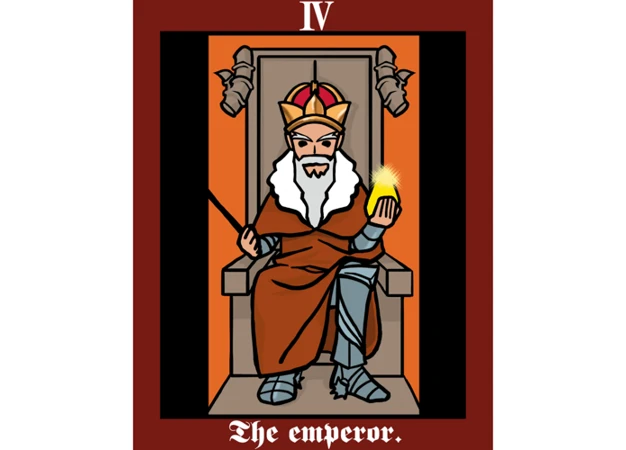In the vast realm of tarot, where each card depicts a unique and intricate story, the Emperor card stands as a powerful embodiment of authority and leadership. With its commanding presence and regal symbolism, this card holds a special place within the tarot deck. From the depths of its iconography to the depths of its interpretation, the Emperor card carries profound insights into love, relationships, career, and success. By delving into the archetypal nature of this card, understanding its reversed meanings, exploring its combinations with other cards, and discovering famous figures who represent its essence, one can unlock a wealth of knowledge and wisdom held within the Emperor card. Step into the world of tarot as we unravel the mysteries of the Emperor card and embark on a journey of self-discovery and personal growth.
Contents
- The Meaning of the Emperor Card
- How to Read the Emperor Card
- Interpreting Reversed Emperor Card
- The Emperor Card in Combination with Other Cards
- Famous Figures Representing the Emperor Card
- Conclusion
-
Frequently Asked Questions
- 1. What does the scepter held by the Emperor symbolize?
- 2. How does the Emperor card relate to the concept of structure?
- 3. What role does the Emperor play in relationships?
- 4. Can the Emperor card indicate a need for control?
- 5. How does the Emperor card influence career choices?
- 6. What does it mean if the Emperor card appears in a reversed position?
- 7. How does the Emperor card interact with the Empress card?
- 8. Can the Emperor card represent a need for personal boundaries?
- 9. What historical figures embody the qualities of the Emperor card?
- 10. How does the Emperor card relate to the zodiac sign Aries?
- References
The Meaning of the Emperor Card
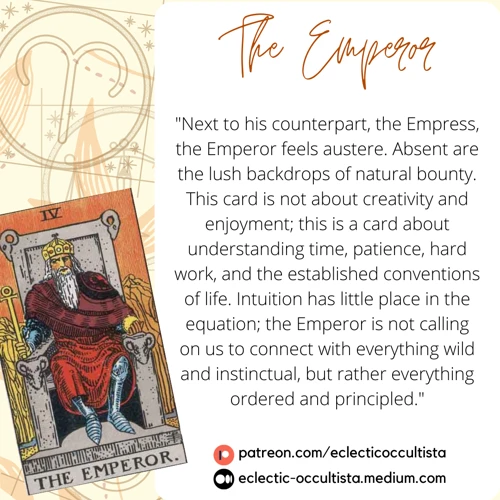
The Emperor card in tarot represents authority, leadership, and a strong sense of order and structure. Depicted as a mature and regal figure sitting on a throne, the Emperor exudes power and control. His attire, typically adorned with armor and a crown, symbolizes his mastery over both the physical and spiritual realms. The Emperor embodies discipline and rationality, bringing stability and organization to any situation. This card is associated with the zodiac sign Aries, further emphasizing its fiery and assertive nature. In a tarot spread, the Emperor often signifies the need to tap into one’s own inner strength and assertiveness to overcome challenges. It encourages embracing responsibility and taking charge of situations with confidence and clarity. The Emperor’s presence suggests the importance of establishing boundaries, setting goals, and adhering to a structured approach. This card serves as a reminder to tap into one’s own authority and leadership potential, channeling them for personal growth and success. The Emperor card can be seen as a counterpart to the Empress card, representing a balance between feminine and masculine energies. Together, they represent a harmonious union of nurturing and assertiveness, creating a solid foundation for growth and prosperity.
1. Symbolism and Iconography
When exploring the symbolism and iconography of the Emperor card, several key elements come into play. Firstly, the Emperor’s throne represents his elevated status and authority. It signifies his position as a ruler and decision-maker. The throne is often adorned with carvings and symbols that evoke stability and power. Secondly, the Emperor’s crown symbolizes his sovereignty and connection to the divine. It serves as a reminder of his divine right to rule and make decisions. The Emperor’s clothing, usually adorned with armor, represents protection and resilience. It signifies a strong defense against any obstacles or challenges that may arise. Additionally, the Emperor’s long white beard suggests wisdom and experience, reflecting his ability to make informed and calculated decisions. His posture and facial expression exude confidence and determination, highlighting his embodiment of leadership. The scepter held by the Emperor represents his power to govern and make authoritative decisions. The presence of the ram, often seen at the feet of the Emperor, symbolizes Aries, the zodiac sign associated with this card. The ram signifies assertiveness, courage, and action-taking. The landscape surrounding the Emperor is typically barren and rocky, showcasing his ability to bring order and structure to chaos. The symbolism and iconography of the Emperor card emphasize his regal authority and strong leadership qualities.
2. Numerology and Tarot Spread Placement
Numerology plays a significant role in understanding the deeper meaning of the Emperor card. In tarot, this card corresponds to the number 4, which signifies stability, structure, and order. The number 4 is associated with the elements, representing a balance between earth, air, water, and fire. The Emperor’s alignment with this number reinforces his role as a symbol of power and authority. When the Emperor card appears in a tarot spread, its placement can further enhance its interpretation.
1. As a Card of Influence: When the Emperor is placed in the past position of a spread, it suggests that the influence of strong leadership or authority figures played a significant role in shaping the current situation. It could indicate past experiences of structure and discipline that have led to the current circumstances.
2. Establishing Boundaries: When the Emperor appears in the present position, it signifies the need for setting clear boundaries and maintaining a structured approach to the current situation. This card encourages one to tap into their own inner authority and take control of their circumstances.
3. Future Potential: In the future position, the Emperor card suggests that the seeker is on the path to embodying qualities of authority and leadership. It indicates that by embracing discipline and organization, they have the potential to shape their future with strength and confidence.
4. External Influences: When the Emperor card appears in the external influences position, it suggests that external factors, such as a mentor or a person in a position of authority, will have a significant impact on the situation at hand. This could indicate the need to seek guidance or advice from someone experienced and knowledgeable.
The numerological significance of the Emperor card, along with its placement in a tarot spread, provides valuable insights into the role of authority, structure, and leadership in the seeker’s life. By understanding these influences, one can navigate their path with strength and establish a solid foundation for success.
3. Interpretations in Love and Relationships
When it comes to love and relationships, the Emperor card brings a dynamic and commanding energy. In a romantic context, the Emperor signifies a partner who is strong, stable, and reliable. This card represents a relationship based on structure, authority, and a sense of security. The Emperor encourages taking charge and being proactive in creating a solid foundation for the partnership. It highlights the need for clear boundaries, communication, and a balanced power dynamic. The Emperor’s presence suggests a need for stability and structure in relationships, emphasizing the importance of setting goals and working together towards a shared vision of the future. For those who are single, the Emperor card may indicate the need to embody its qualities of confidence and assertiveness in order to attract a partner with similar characteristics. It encourages taking a leadership role in one’s own love life and being proactive in pursuing genuine connections. However, it is essential to strike a balance between assertiveness and consideration for the needs and desires of the other person. The Emperor card reminds individuals to approach relationships with a sense of responsibility and authority, while also nurturing and supporting their partner’s growth and well-being. For a more in-depth understanding of love and relationships in tarot, you can explore the significance of the Lovers card and its symbolism in decoding love and relationships.
4. Insights into Career and Success
When it comes to career and success, the Emperor card offers valuable insights and guidance. Symbolizing authority and leadership, this card encourages individuals to take charge of their professional lives and embrace their inner power. In a career context, the Emperor signifies the need for structure, organization, and discipline. It advises individuals to establish clear goals, develop strategies, and tap into their assertiveness to advance in their chosen path. The Emperor reminds individuals to assert their expertise, make confident decisions, and take responsibility for their actions. This card also suggests the importance of creating a harmonious balance between assertiveness and collaboration. It encourages individuals to lead by example, inspire others, and create a positive and productive work environment. The Emperor signifies success achieved through discipline and hard work, urging individuals to stay focused, persevere, and reach their full potential. By aligning their career choices with their ambitions and utilizing their leadership skills, individuals can navigate the professional world with confidence and achieve their desired level of success. Remember, like the interconnected nature of tarot cards, the Emperor’s influence can be enhanced when combined with other cards, such as the Star Card, which symbolizes hope and inspiration. By incorporating hope and inspiration into their professional endeavors, individuals can unlock even greater achievements in their careers.
How to Read the Emperor Card
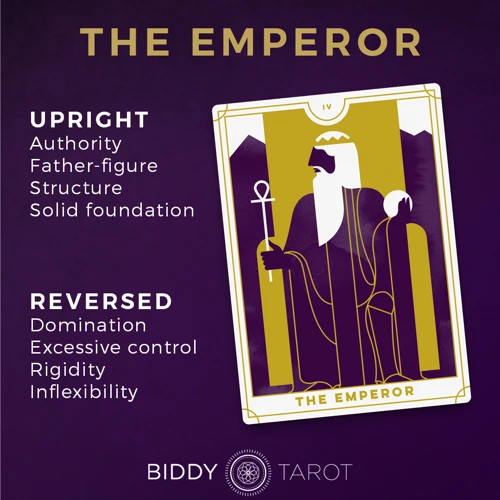
To effectively read the Emperor card in a tarot reading, it is essential to understand the underlying archetypal energy it represents. The Emperor embodies authority, leadership, and structure. Here are some key steps to help you interpret the Emperor card:
1. Understanding the Archetype: Dive into the traditional symbolism and attributes associated with the Emperor. Explore the imagery of the throne, armor, and crown. Connect with the energy of assertiveness, discipline, and control. Reflect on how these qualities manifest in your life and the significance they hold.
2. Keywords and Phrases: Identify the keywords and phrases that resonate with the Emperor card. These may include words like power, order, stability, responsibility, and discipline. Take note of any specific imagery or symbols that catch your attention and explore their meanings.
3. Contextualize the Card: Consider the placement of the Emperor card within the tarot spread. Is it in the past, present, or future position? Determine how its energy relates to the overall theme of the reading. Pay attention to the cards surrounding it to gain further insights into its influence and significance.
4. Tap into your Intuition: Allow your intuition to guide you as you interpret the Emperor card. Trust your inner knowing and the messages that come through. Pay attention to any intuitive flashes or feelings that arise during the reading.
5. Embrace Personal Reflection: Encourage the querent to reflect on their own relationship with authority and leadership. How do they embody these qualities in their lives? Are there any areas where they may need to step into their own power or establish healthy boundaries?
6. Seek Balance: As with any card, it is crucial to consider both the positive and potential challenges associated with the Emperor. Strive for a balanced approach, recognizing the need for structure and authority while remaining open to flexibility and adaptability.
Remember, the Emperor card serves as a guidepost for embracing your own authority, exercising leadership, and introducing organization into your life. Utilize these steps to unlock the deeper layers of the Emperor card’s meaning and gain valuable insights into your personal journey.
1. Understanding the Archetype
Understanding the archetype of the Emperor card delves into the deeper layers of its symbolism and meaning. The Emperor serves as a representation of authority figures, patriarchal power structures, and the embodiment of traditional masculine traits. This archetype resonates with qualities such as control, assertiveness, responsibility, and the ability to create order out of chaos. In psychological terms, the Emperor archetype can be seen as the manifestation of the “father figure” or the “wise ruler” in one’s life. He represents the aspect of the self that desires structure, stability, and the imposition of rules or boundaries. When the Emperor card appears in a reading, it invites an exploration of one’s own relationship with power, authority, and leadership. It prompts self-reflection on how these qualities manifest in individuals and how they can be harnessed for personal growth and success. The Emperor archetype can also act as a guide, encouraging individuals to tap into their inner strength, make decisive choices, and take charge of their lives. In this sense, the Emperor serves as a beacon of inspiration and motivation, guiding individuals towards a path of empowerment and self-assurance. It is important to remember that the Emperor archetype may have both positive and negative aspects, and its interpretation should be considered in the context of the entire tarot reading. By understanding the archetype of the Emperor, individuals can gain valuable insights into their own authority and leadership potential, allowing them to navigate life’s challenges with confidence and purpose.
2. Keywords and Phrases
When it comes to understanding the Emperor card, there are certain keywords and phrases that can offer deeper insights into its meaning and interpretation. Some key terms associated with the Emperor include authority, leadership, structure, discipline, power, control, order, stability, and assertiveness. These words highlight the dominant characteristics embodied by the Emperor and set the tone for understanding its impact in a tarot reading. The Emperor card represents the need to take charge, assert one’s authority, and establish a sense of order in both personal and professional aspects of life. It signifies the importance of structure and discipline in achieving goals and maintaining stability. The Emperor card encourages the individual to tap into their own inner strength and assertiveness, embracing their leadership potential. It serves as a reminder that with control and rationality, one can navigate challenges and create a solid foundation for success. By incorporating these keywords and phrases into a tarot reading, one can gain a better understanding of the Emperor’s influence and the guidance it offers in various aspects of life. Embrace the keywords associated with the Emperor and let them inspire you to step into your own power and authority with confidence.
Interpreting Reversed Emperor Card
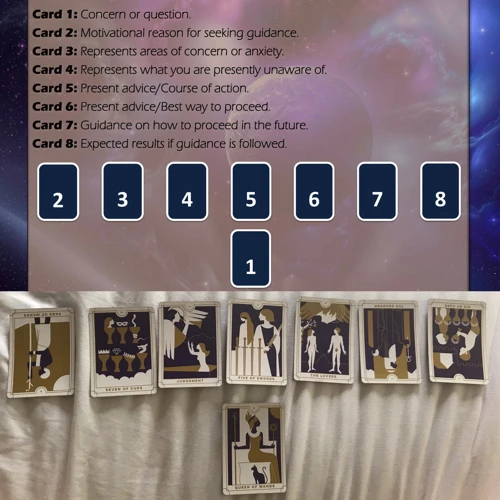
When the Emperor card appears reversed in a tarot reading, it indicates a disruption or imbalance in authority and leadership. This reversal suggests a lack of control or an abuse of power. It may point to a situation where someone is acting tyrannically or using their authority for self-serving purposes rather than for the greater good. The reversed Emperor can also signify a rebellion against traditional structures and a desire to break free from societal expectations. In such cases, it may be important to reassess the way power is being wielded and consider alternative approaches. On a personal level, the reversed Emperor can indicate a loss of confidence or a struggle with asserting oneself. It could be a sign of feeling overwhelmed by responsibilities or being unsure of how to take charge of a situation. This card urges introspection and a reevaluation of one’s leadership style and approach. It may be beneficial to seek guidance from others or seek moments of reflection and solitude, such as embracing the energy of the Hermit card. By addressing these imbalances and taking the time for self-reflection, one can better align with their own authentic authority and restore harmony in their leadership roles. Remember, the reversed Emperor is not necessarily negative, but rather an invitation to explore different paths and find a more balanced and authentic expression of authority and leadership. Embracing change and seeking inspiration like the Star card can be helpful in this process.
1. Reversed Emperor Card Meanings
When the Emperor card appears in a reversed position in a tarot reading, its meanings take on a different tone. Rather than embodying authority and leadership, the reversed Emperor signifies a potential imbalance of power or issues with asserting control. It suggests a lack of structure or discipline, leading to chaos or a loss of direction. The reversed Emperor can indicate a struggle with maintaining boundaries or feeling overwhelmed by responsibilities. It may represent a decline in personal authority or difficulties in making decisions confidently. This card often serves as a reminder to realign oneself with one’s inner power and regain control over situations. It prompts individuals to reflect on their leadership style and assess if it needs adjustment or transformation. In some cases, the reversed Emperor might indicate the presence of a domineering figure who is abusing their power or lacking in fair judgment. It calls for a step back and evaluation of power dynamics to restore balance and harmony. By embracing traits such as adaptability and open-mindedness, individuals can overcome the challenges associated with the reversed Emperor and regain their sense of authority and leadership. If you’d like to explore more about tarot readings and their meanings, you may find the Star Card article a source of hope and inspiration, or the Hermit Card article helpful in embracing solitude and introspection.
Exploring the blocks to authority and leadership within the Emperor card can reveal valuable insights into one’s personal growth and development. When the Emperor card appears in a tarot reading in reverse, it indicates a potential lack of confidence or an excessive need for control. This can create obstacles on the path to embodying true authority and leadership. In such instances, it is important to reflect on any limiting beliefs or fears that may be holding one back from embracing their own power. It could be a fear of failure, a fear of rejection, or a lack of trust in one’s abilities. By recognizing and addressing these blocks, individuals can begin to cultivate a stronger sense of self-assurance and assertiveness. Self-reflection and inner work are essential in breaking through these barriers to leadership. Additionally, seeking guidance and support from mentors or seeking inspiration from other authoritative figures can be helpful in overcoming these challenges. The journey to fully embodying authority and leadership involves continuous growth, self-awareness, and perseverance. By facing these blocks head-on, individuals can reclaim their power and step into their roles as confident leaders.
The Emperor Card in Combination with Other Cards
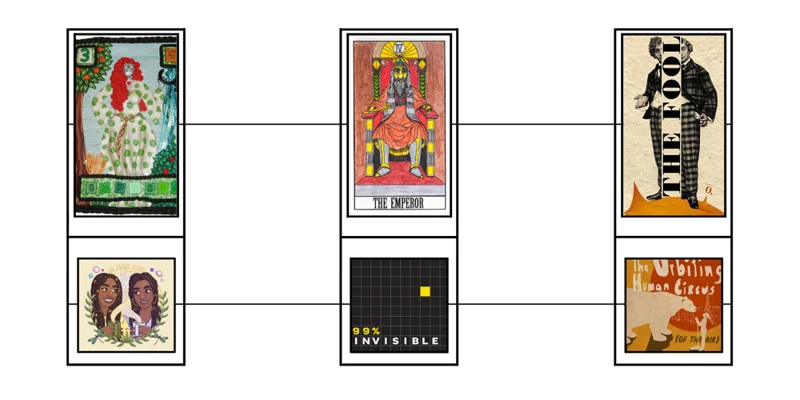
The Emperor card holds a significant role in tarot readings, especially when combined with other cards. These combinations offer nuanced insights into various aspects of life and relationships. Let’s explore some powerful combinations involving the Emperor:
1. The Emperor and The Empress:
When the Emperor and the Empress cards appear together, it signifies a balanced union of masculine and feminine energies. This combination represents a harmonious partnership, where authority, leadership, and nurturing qualities unite. It indicates a strong and supportive relationship where both partners contribute equally, creating a solid and prosperous foundation.
2. The Emperor and The Hierophant:
The Emperor combined with the Hierophant suggests a presence of traditional values and structures. This combination represents the blending of established authority and spiritual guidance. It signifies the need to seek wisdom from experienced mentors or institutions, providing a stable framework for personal growth and exploration.
3. The Emperor and The Chariot:
When the Emperor and the Chariot cards are combined, it represents a potent blend of ambition, determination, and control. This combination signifies a focused and driven approach to achieving goals. It suggests that by utilizing one’s leadership skills and self-discipline, one can overcome obstacles and attain success through strategic decision-making and assertive action.
By examining the Emperor card in combination with other cards, readers gain a deeper understanding of how authority and leadership influence different areas of life. These combinations reveal the interplay between power, structure, and other forces within the tarot deck, allowing for richer interpretations and guidance.
1. The Emperor and The Empress
When the Emperor and the Empress cards appear together in a tarot reading, they create a dynamic and powerful combination. The Emperor embodies masculine energy, authority, and structure, while the Empress represents feminine energy, nurturing, and creativity. When these two cards come together, they symbolize a balanced and harmonious union. Together, they signify the integration of both assertiveness and compassion, discipline and intuition. The Emperor and the Empress represent the perfect partnership and collaboration, as they bring together the qualities of leadership and nurturing. This combination often indicates a strong and loving relationship, where both partners support and empower each other. It signifies a harmonious balance between the yin and yang energies, creating a solid foundation for growth and success. In a tarot reading, the presence of the Emperor and the Empress cards together may signify the potential for achieving great things, both in personal and professional aspects of life. It encourages embracing both masculine and feminine qualities within oneself and in relationships, allowing for a holistic approach to decision-making and problem-solving. Together, the Emperor and the Empress cards remind us of the power that comes from embracing the different aspects of our own nature and finding synergy in partnerships and collaborations. By working in harmony with these energies, we can cultivate fulfillment, abundance, and balance in our lives.
2. The Emperor and The Hierophant
2. The Emperor and The Hierophant are two powerful tarot cards that complement each other in their symbolism and meaning. While the Emperor represents authority and leadership, the Hierophant signifies tradition, wisdom, and spiritual guidance. The Emperor’s assertive energy aligns well with the Hierophant’s emphasis on tradition and structured belief systems. Together, these cards create a dynamic combination that speaks to the balance between personal power and spiritual guidance.
When the Emperor and the Hierophant appear together in a tarot reading, it suggests the need to find a balance between personal ambition and adhering to established systems or institutions. It indicates the importance of using one’s authority and leadership skills to navigate within existing frameworks, respecting the wisdom and teachings of those who came before. This combination signifies a time of seeking guidance from mentors and spiritual leaders who can provide valuable insights and direction. It may also indicate a need to explore one’s own belief systems and align them with a higher sense of purpose.
In the realm of relationships, the Emperor and the Hierophant combination signifies a partnership built on mutual respect and shared values. It represents a union where both individuals bring their own unique strengths and leadership qualities to the table. This combination suggests finding stability and harmonious structure within a relationship by respecting each other’s autonomy while adhering to common principles and traditions.
In a career context, the Emperor and the Hierophant combination speaks to the need for a structured and disciplined approach to achieve success. It suggests seeking guidance from experienced professionals or mentors who can provide valuable insights and help navigate the established systems within a particular field. This combination encourages embracing traditional wisdom while incorporating innovative leadership strategies to make a meaningful impact.
The combination of the Emperor and the Hierophant signifies a harmonious blend of personal power and spiritual guidance. It reminds us of the importance of respecting authority, tradition, and belief systems while harnessing our own leadership skills to make a positive difference in our lives and the lives of others.
3. The Emperor and The Chariot
When the Emperor card and the Chariot card appear together in a tarot reading, they bring a dynamic combination of authority, control, and determination. These two cards work in harmony to symbolize a powerful force of leadership and achievement.
The Emperor signifies structure, discipline, and a strategic approach to leadership. With his unwavering determination and strong sense of authority, he sets the foundation for success. On the other hand, the Chariot represents forward motion, willpower, and the drive to overcome obstacles. Its depiction of a charioteer steering two contrasting sphinxes demonstrates the need for balance and control over opposing forces.
Together, the Emperor and the Chariot represent a harmonious blend of assertiveness, determination, and agility. They indicate that through disciplined leadership and strategic planning, one can navigate challenges and achieve triumph. This combination suggests the importance of staying focused on goals, maintaining control over emotions, and embracing a structured approach to leadership. It encourages individuals to tap into their inner strength and take charge of their journey, directing it towards success and accomplishment.
In the context of a relationship reading, the Emperor and the Chariot can indicate a power couple or a partnership built on strong foundations. It suggests a relationship where both individuals share a vision, work together as a team, and have the drive to overcome any obstacles that come their way. This combination also implies that leadership and authority play a significant role in the dynamics of the relationship, with both partners respecting and supporting each other’s goals.
In a career reading, the Emperor and the Chariot signify a period of growth and upward momentum. It suggests that the individual has the necessary skills, discipline, and determination to take charge of their professional life. With strategic planning and a structured approach, success and recognition can be achieved. This combination also emphasizes the importance of maintaining focus, staying motivated, and harnessing one’s inner strength to navigate challenges and reach career goals.
The Emperor and the Chariot together represent a powerful force of leadership, control, and determination. Whether in relationships or careers, this combination encourages individuals to embrace their authority, maintain discipline, and take charge of their journey towards success and accomplishment.
Famous Figures Representing the Emperor Card
Famous figures from both history and popular culture have embodied the essence of the Emperor card in their personas and actions. These individuals hold traits of strong leadership, authority, and the ability to command respect. In the realm of history, one such figure who exemplifies the Emperor card is Julius Caesar. Known for his military prowess, strategic thinking, and ability to establish a powerful empire, Caesar demonstrated the qualities of decisive leadership and dominance. Another historical figure representing the Emperor card is Emperor Napoleon Bonaparte. His rise to power, military conquests, and establishment of a centralized government showcase his embodiment of authority and control. Moving into the realm of popular culture, characters like Tywin Lannister from Game of Thrones exhibit the Emperor’s traits. Tywin is a powerful and influential figure who exerts control over his family and kingdom with stern authority. Additionally, characters portrayed by actors such as Morgan Freeman and Anthony Hopkins often embody the calm yet commanding presence associated with the Emperor card. These individuals have left a lasting impact on society, further reinforcing the archetype of the Emperor and its significance in leadership and authority.
1. Historical Figures
1. Historical Figures
Throughout history, there have been numerous individuals who embody the traits and characteristics symbolized by the Emperor card. These figures have left indelible marks on the world through their strong leadership, authority, and ability to maintain order. One such historical figure is Julius Caesar, the famed Roman general and statesman. Known for his military prowess and strategic leadership, Caesar established a strong and centralized government, which laid the foundation for the Roman Empire. With his unwavering determination and ability to command respect, he exemplified the qualities of the Emperor archetype.
Another historical figure who embodies the Emperor card is Emperor Charlemagne, also known as Charles the Great. As the first emperor of the Holy Roman Empire, Charlemagne was revered for his administrative skills, cultural revival, and military conquests. His reign was marked by ambitious reforms and an unwavering commitment to maintaining law and order throughout his vast empire. Charlemagne’s strong presence and firm leadership made him a true embodiment of the Emperor card.
Emperor Qin Shi Huang, the first emperor of unified China, is a notable example of the Emperor archetype. His leadership skills and determination led to the unification of China and the establishment of the Qin Dynasty. Qin Shi Huang implemented strict legal systems, standardized measurements, and constructed the Great Wall of China. His actions portrayed a sense of authority, control, and governance – all qualities closely aligned with the Emperor card.
These historical figures demonstrate how the essence of the Emperor card transcends time and culture. Through their remarkable achievements, they exemplify the importance of strong leadership, discipline, and decisive action in shaping the course of history. These individuals serve as a reminder of the timeless influence and power embodied by the Emperor card in tarot.
2. Pop Culture Icons and Celebrities
Pop culture is filled with iconic figures who embody the characteristics of the Emperor card. These individuals demonstrate authority, leadership, and a commanding presence both on and off the screen. One such figure is the beloved superhero, Superman. Known for his unwavering strength and moral compass, Superman exemplifies the Emperor’s ability to protect and lead with integrity. Another noteworthy example is former President Barack Obama. As the leader of a nation, Obama displayed strong leadership skills, diplomacy, and a calm demeanor even in the face of adversity, reflecting the Emperor’s ability to navigate challenging situations with grace and authority. Elon Musk, the innovative entrepreneur and CEO of companies like Tesla and SpaceX, also embodies the Emperor’s qualities. Musk’s visionary leadership and ambition have propelled him to great success, showcasing the Emperor’s ability to forge ahead and create new paths. These pop culture icons and celebrities not only capture the essence of the Emperor card but also serve as a source of inspiration for those looking to embrace their own authority and leadership potential.
Conclusion
In conclusion, the Emperor card in tarot holds a significant place in the realm of authority and leadership. Through its symbolism and iconography, it portrays strength, discipline, and order. The Emperor’s presence in a tarot reading signifies the need to tap into one’s own inner power and take charge of situations with confidence. It encourages the establishment of boundaries and the setting of clear goals. Through its numerological significance and placement in a tarot spread, the Emperor offers insights into various aspects of life, including love, relationships, and career success. Understanding the archetypal nature of the Emperor card allows for a deeper exploration of its meanings and the keywords and phrases associated with it. Exploring the reversals of the Emperor card reveals the potential blocks to authority and leadership, providing opportunities for personal growth and reflection. The Emperor card’s interactions with other cards in the tarot deck, such as the Empress and the Hierophant, offer additional layers of interpretation and insight. Lastly, delving into historical figures and pop culture icons who embody the qualities of the Emperor card showcases its relevance and impact throughout different periods. The Emperor card invites individuals to embrace their own authority and leadership potential, bringing structure and success into their lives. As with all tarot cards, the Emperor serves as a tool for self-reflection and personal growth, offering guidance and inspiration on the journey of life. Let the wisdom and power of the Emperor guide you on your path to success and fulfillment.
Frequently Asked Questions
1. What does the scepter held by the Emperor symbolize?
The scepter held by the Emperor symbolizes his authority and power. It represents his ability to make decisions, enforce order, and assert his leadership.
2. How does the Emperor card relate to the concept of structure?
The Emperor card highlights the importance of structure in one’s life. It encourages the establishment of clear boundaries, setting goals, and adhering to a disciplined approach to achieve success.
3. What role does the Emperor play in relationships?
In relationships, the Emperor represents a partner who provides stability, protection, and guidance. It signifies a sense of security and a balanced power dynamic within the partnership.
4. Can the Emperor card indicate a need for control?
While the Emperor card embodies leadership and authority, it is important to note that excessive control can be detrimental. The card encourages healthy assertiveness and the ability to delegate and trust others.
5. How does the Emperor card influence career choices?
The Emperor card often signifies a need for a structured and disciplined approach to career choices. It suggests taking charge, making informed decisions, and effectively utilizing one’s leadership skills to achieve professional success.
6. What does it mean if the Emperor card appears in a reversed position?
When the Emperor card appears reversed, it suggests a potential imbalance in authority and leadership. It can indicate a need to reassess one’s approach to power, address controlling tendencies, and seek a more collaborative leadership style.
7. How does the Emperor card interact with the Empress card?
The Emperor and the Empress cards together represent a harmonious union of masculine and feminine energies. They symbolize the blending of assertiveness and nurturing qualities, creating a balanced foundation for personal growth and success.
8. Can the Emperor card represent a need for personal boundaries?
Yes, the Emperor card often signifies the need to establish and enforce personal boundaries. It reminds individuals to value themselves and their own needs, setting limits to maintain a healthy balance in relationships and interactions.
9. What historical figures embody the qualities of the Emperor card?
Historical figures like Julius Caesar, Alexander the Great, and Napoleon Bonaparte are often associated with the qualities of leadership, authority, and strategic thinking, mirroring the essence of the Emperor card.
10. How does the Emperor card relate to the zodiac sign Aries?
The Emperor card is associated with the zodiac sign Aries, which is known for its assertiveness, confidence, and leadership traits. It reflects the bold and fiery nature of Aries, emphasizing the power and determination of the Emperor.
